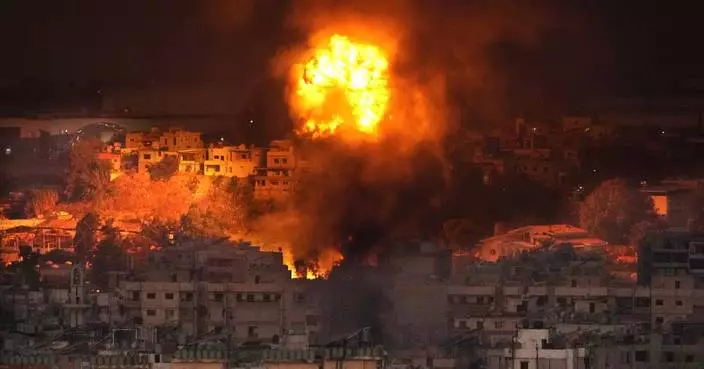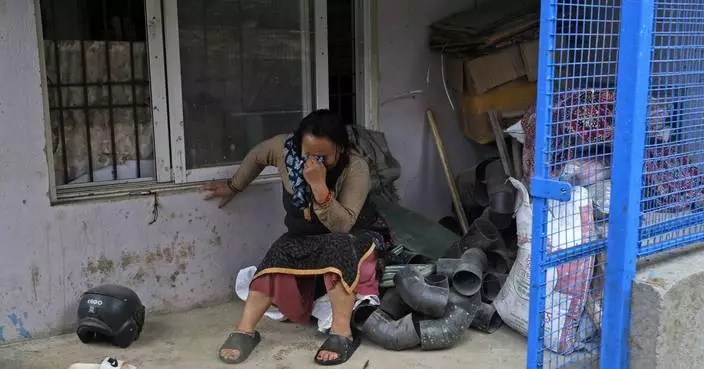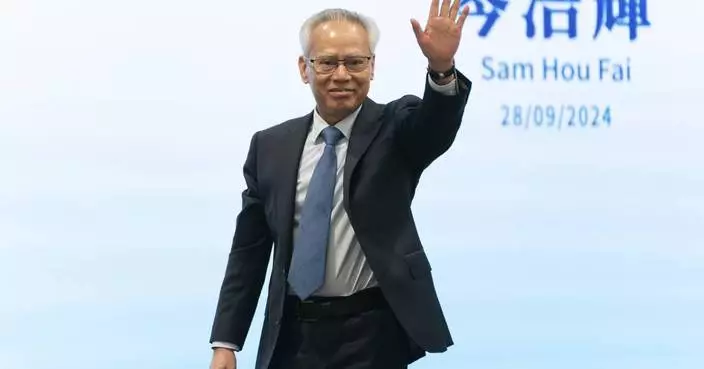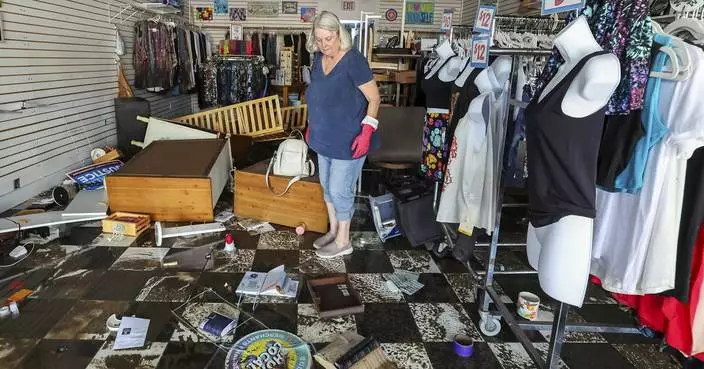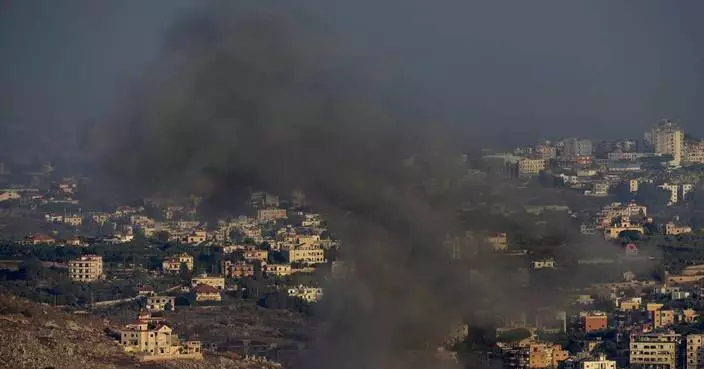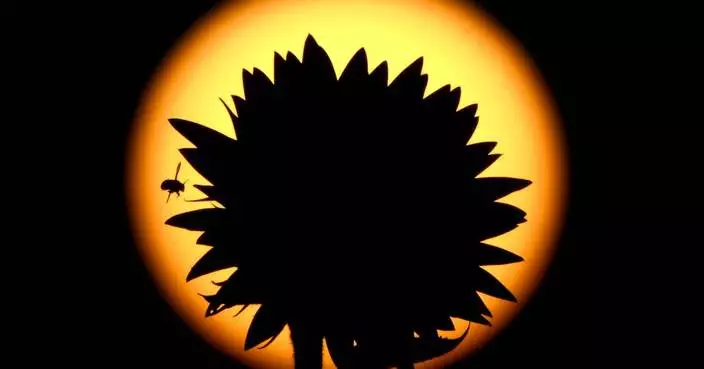ROME (AP) — The steroid case involving top-ranked tennis player Jannik Sinner was appealed by the World Anti-Doping Agency, the Montreal-based body announced Saturday.
WADA said it is seeking a ban of one to two years for the U.S. Open champion but indicated that it does not plan to back date an eventual ban — which would mean that Sinner could keep his second Grand Slam title if he is found guilty.
The announcement was made while Sinner was on court against Roman Safiullin at the China Open in Beijing.
“Obviously, I’m very disappointed and also surprised of this appeal, to be honest, because we had three hearings. All three hearings came out very positively for me,” the 23-year-old Sinner said after beating Safiullin.
“You know, I was not expecting it. I knew it couple of days ago, that they were going to appeal, that today it’s going to go official, so... it’s surprise,” he added. “We always talk about the same thing. Maybe they just want to make sure that everything is in the right position. Yeah, I’m just surprised that they appealed.”
Sinner tested positive twice for an anabolic steroid in March but was not banned in a decision by an independent tribunal announced by the International Tennis Integrity Agency on Aug. 20 because the ITIA determined he was not to blame.
Sinner’s accepted explanation was that the banned performance-enhancer entered his system unintentionally through a massage from his physiotherapist, who had used a spray containing the steroid to treat their own cut finger.
WADA said it filed an appeal on Thursday to the Switzerland-based Court of Arbitration for Sport.
“It is WADA’s view that the finding of ‘no fault or negligence’ was not correct under the applicable rules,” WADA said in a statement. “WADA is seeking a period of ineligibility of between one and two years. WADA is not seeking a disqualification of any results, save that which has already been imposed by the tribunal of first instance."
WADA suggested the rules were not followed correctly despite prosecutor Nicolas Zbinden for tennis’ integrity body — which accepted Sinner’s version of events — being a lawyer who regularly works on high-profile cases for the global watchdog, including the successful appeal against Russian figure skater Kamila Valieva.
An appeal verdict at CAS could come quickly — even within just a few months — if the parties agree to cooperate. At least that’s how it worked in another high-profile doping case in tennis involving Maria Sharapova.
Still, the case likely won't be resolved before Sinner begins the defense of his Australian Open title in January.
Sharapova tested positive at the Australian Open in January 2016 for the newly-banned heart medication meldonium. She was banned for two years in June that year by the International Tennis Federation.
The Russian star appealed to CAS, had an appeal hearing in New York before three judges that September, and four weeks later got the verdict that cut her ban to 15 months.
The entire process for Sharapova with CAS took just four months — far shorter than most doping cases, which typically last for about one year. The timeline can stall with the complexities of picking a judging panel, finding a hearing date and parties exchanging documents and evidence from expert witnesses.
During the Indian Wells hard-court event in March, Sinner tested positive for low levels of a metabolite of Clostebol, a banned anabolic steroid that can be used for ophthalmological and dermatological use. It’s the same drug for which San Diego Padres star Fernando Tatis Jr. was suspended by MLB in 2022.
Sinner tested positive again eight days later in an out-of-competition sample.
He was provisionally suspended twice by the tennis integrity body because of those test results, but he successfully appealed twice to an independent tribunal judge and was allowed to keep competing on tour.
Sinner said his test results happened because his fitness trainer purchased an over-the-counter spray called Trofodermin in Italy that contained Clostebol and gave it to Sinner’s physiotherapist to treat a cut on the physiotherapist’s finger. The physiotherapist then treated Sinner without wearing gloves.
The ITIA said it accepted Sinner’s explanation, after 10 interviews with the player and his entourage, and the independent panel agreed at a hearing on Aug. 15.
The tennis integrity body decision did order to Sinner to lose the $325,000 in prize money and 400 rankings points he earned at the tournament in Indian Wells.
Sinner later announced that he had fired his two trainers.
AP Sports Writer Graham Dunbar in Lausanne, Switzerland, contributed.
AP tennis: https://apnews.com/hub/tennis

FILE - Italy's Jannick Sinner gestures after defeating Chile's Nicolas Jarry during the China Open tennis tournament held at the National Tennis Center in Beijing, Thursday, Sept. 26, 2024. (AP Photo/Ng Han Guan, File)

FILE - Jannik Sinner, of Italy, wipes sweat from his face between serves to Mackenzie McDonald, of the United States, during the first round of the U.S. Open tennis championships, Tuesday, Aug. 27, 2024, in New York. (AP Photo/Kirsty Wigglesworth, File)
Smoke rose from Beirut’s southern suburbs Saturday morning and the streets were empty after the area was pummeled overnight by heavy airstrikes that Israel said killed multiple Hezbollah commanders, including leader Hassan Nasrallah.
Hezbollah did not immediately confirm Israel's claim.
Attacks on Hezbollah targets by fighter jets Friday continued into the early hours Saturday after the army said it told residents to evacuate three buildings it was targeting.
Hours before the strikes, Prime Minister Benjamin Netanyahu addressed the United Nations, vowing that Israel’s campaign against Hezbollah would continue — further dimming hopes for an internationally backed cease-fire. Netanyahu abruptly cut his United States visit short and returned to Israel.
More than 720 people have been killed in Lebanon since the conflict escalated Monday, according to Lebanon’s Health Ministry.
The United Nations says the number of those displaced by the conflict from southern Lebanon has more than doubled, with more than 211,000 people now displaced. At least 20 primary health care centers have shut down in hard-hit areas of Lebanon, the U.N. Office for Coordination of Humanitarian Affairs said.
Hezbollah began firing rockets into northern Israel in support of Hamas after it stormed into Israel, sparking the Israel-Hamas war. Top Israeli officials have threatened to repeat the destruction of Gaza in Lebanon if the Hezbollah fire continues, raising fears that Israel’s actions in Gaza since Oct. 7 would be repeated in Lebanon.
Here’s the latest:
TEHRAN — Iranian state television says a flight from Tehran bound for Lebanon was turned away from Beirut airport on Saturday.
It reported that the decision came following a warning by Israel that the airport could be targeted if the passenger plane landed.
Israel’s military says it will not allow the civilian airport to be used for military purposes and that pilots are patrolling the skies over the airport for weapons smuggling.
Sky News reported that Lebanon’s transport minister intervened to stop the plane from landing.
TEHRAN – Iran’s supreme leader has urged all Muslims to stand by Hezbollah against Israel, but has not indicated how Tehran will respond to the reported killing of the group‘s leader Hassan Nasrallah.
Iran is the main backer of Hezbollah and other anti-Israeli militant groups in the region.
In his first comments since Israel claimed to have killed Nasrallah, Supreme Leader Ayatollah Ali Khamenei said, “it is the duty of all Muslims to stand by the people of Lebanon and Hezbollah” against the “occupier, evil and suppressor” regime of Israel.
In a statement read on state TV, he said “all regional resistance forces” support and stand beside Hezbollah.
Iran’s influential parliamentary committee on national security met Saturday and demanded a “strong” response to Israel, state TV reported.
In April, for the first time, Iran fired hundreds of missiles and drones toward Israel following an Israeli strike that killed Iranian military advisors.
JERUSALEM — Israel's military says it expects Hezbollah to retaliate for the death of its leader Hassan Nasrallah and is on “high readiness.”
Army spokesman Lt. Col. Nadav Shoshani said much of Hezbollah’s arsenal remains intact despite intense Israeli strikes over the past week, and that Israel will continue to target the group.
“This isn’t a threat that has gone away,” he said. Shoshani said it is “safe to assume” that Hezbollah will retaliate.
But he said Israel hopes the blow “will change Hezbollah’s actions” and alter the course of the war.
Shoshani said the airstrike targeting Nasrallah was based on years of tracking him, along with “real-time information.” He said Israel confirmed the death through various types of intelligence, though he declined to elaborate.
COLOGNE, Germany — The European Union Aviation Safety Agency has recommended that airlines not operate in Lebanese or Israeli airspace.
The Cologne, Germany-based EASA said Saturday that “an overall intensification of air strikes and degradation in the security situation has been noted, impacting the safety of airspace over Israel and Lebanon.”
It did not cite any one specific event in the conflict between Israel and Hezbollah as a trigger for issuing its “conflict zone information bulletins” for the two countries.
It said the recommendation is valid until Oct. 31 but could be reviewed earlier and adapted or withdrawn.
TEL AVIV — The Israeli military said Saturday that it killed Hassan Nasrallah, the leader of the Hezbollah militant group, in a strike in Beirut on Friday.
The military said that it carried out a precise airstrike while Hezbollah leadership met at their headquarters in Dahiyeh, south of Beirut.
Ali Karki, the Commander of Hezbollah’s Southern Front, and additional Hezbollah commanders, were also killed in the attack, the Israeli military said. The Lebanese Health Ministry said that 6 people were killed and 91 injured in the strikes on Friday, which leveled six apartment buildings.
Nasrallah has led Hezbollah for more than three decades. There was no immediate comment from Hezbollah.
Israel maintained a heavy barrage of airstrikes against Hezbollah on Saturday, as Hezbollah launched dozens of rockets toward Israel.
TEL AVIV, Israel — The Israeli military said it was mobilizing additional reserve soldiers as tensions escalate with Lebanon. The military said Saturday morning it was activating three battalions of reserve soldiers, after earlier sending two brigades to northern Israel earlier in the week to train for a possible ground invasion.
On Saturday morning, the Israeli military carried out several strikes in southern Beirut and eastern Lebanon’s Bekaa Valley. Hezbollah launched dozens of projectiles across northern and central Israel and the Israel-occupied West Bank.
In Beirut’s southern suburbs, smoke rose and the streets were empty after the area was pummeled overnight by heavy Israeli airstrikes. Shelters set up in the city center for displaced people were overflowing. Many families slept in public squares and beaches or in their cars. On the roads leading to the mountains above the capital, hundreds of people could be seen making an exodus on foot, holding infants and whatever belongings they could carry.
CAIRO — An Israeli airstrike killed at least two people and wounded 11 others in the central Nuseirat refugee camp in Gaza, the Awda hospital said.
The strike hit a house late Friday in the camp, according to the hospital which received the casualties in the first hours of Saturday.
More than 41,000 Palestinians have been killed in the nearly year-long war. Over the past few days, the Israeli military has carried out strikes in northern and central Gaza, which they said were targeting Hamas militants operating from civilian areas.
TEL AVIV — Hezbollah launched more than two dozen projectiles toward Israel Saturday morning, triggering sirens in more than 100 cities and towns across Israel and the Israeli-occupied West Bank.
The Israeli military said a surface-to-surface missile was fired from Lebanese territory and fell in an open area in central Israel. Israeli media said the missile fell in the sea.
No injuries or damages were reported, according to Israel’s Fire and Rescue Services.
While Israel and Hezbollah have traded fire since Oct. 8 mostly in the area around the border, in the past weeks, the strikes have targeted much deeper into both countries.
This week, Israeli airstrikes have killed more than 720 people in Lebanon, including dozens of women and children, according to Health Ministry statistics. A number of people have been injured in Israel.
BEIRUT — Patients in hospitals in Beirut’s southern suburbs will be evacuated to medical centers in the capital and the nearby Mount Lebanon region, Lebanon’s Health Ministry says.
In a statement carried by state news agency early Saturday, the ministry called on hospitals in Beirut and Mount Lebanon to stop receiving cases that can be delayed in order to receive patients evacuating from the hard-hit southern suburb Dahiyeh.
The ministry’s decision came after a night of Israeli airstrikes on Dahiyeh, a predominantly Shiite district. The ministry also called on hospitals and medical centers to care for ill people who fled Dahiyeh overnight as a result of the airstrikes.
BEIRUT — Smoke rose from Beirut’s southern suburbs Saturday morning and the streets were empty after the area was pummeled overnight by heavy Israeli airstrikes.
Explosions rocked Beirut’s southern suburbs, with flames lighting up the pre-dawn darkness. Fire raged from at least one location, and smoke and flames were seen from above Beirut early Saturday. Residents reported jets flying overhead.
In a short statement, the Israeli military described the sites it hit as belonging to Hezbollah. Authorities there did not immediately acknowledge if there were any casualties.
Shelters set up in the city center for people displaced by the onslaught were overflowing. Many families slept in public squares and beaches, or in their cars. On the roads leading to the mountains above the capital, hundreds of people could be seen making an exodus on foot, holding infants and whatever belongings they could carry.
JERUSALEM — Israel’s military said it killed a Hezbollah missile unit commander and his deputy during a strike in southern Lebanon earlier in the week.
Israel Defense Forces said in a statement that its air forces killed Muhammad Ali Ismail, who it said was responsible for directing “numerous terror attacks” against Israel, including the firing of rockets towards Israeli territory.
The Tuesday strike also killed the commander’s deputy, Hussein Ahmad Ismail, it said.
There was no immediate confirmation from Hezbollah.
BEIRUT — The United Nations said the escalating violence between Israel and Hezbollah has forced at least 20 primary health care centers to shut down in hard-hit areas of Lebanon.
The U.N. Office for Coordination of Humanitarian Affairs, or OCHA, said in the latest escalation that began earlier in the week, Israeli airstrikes impacted 25 water facilities, affecting access to clean water for nearly 300,000 in high-risk areas.
The escalation since Sept. 23 has also more than doubled the number of those displaced by the conflict from southern Lebanon. There are now over 211,000 people displaced, some 85,000 of them now living in public schools and other shelters spread around the country’s north and east.
A new phase of escalation began Friday, when Israel targeted Hezbollah’s leader in the southern suburb of Beirut, in one of the largest blasts to hit the Lebanese capital in years. The fate of the group’s leader is still unknown. After the initial strike early Friday evening, Israeli warplanes continued to pound buildings and targets in the southern suburb for over six hours. Smoke and balls of fire covered the Beirut skyline for hours.
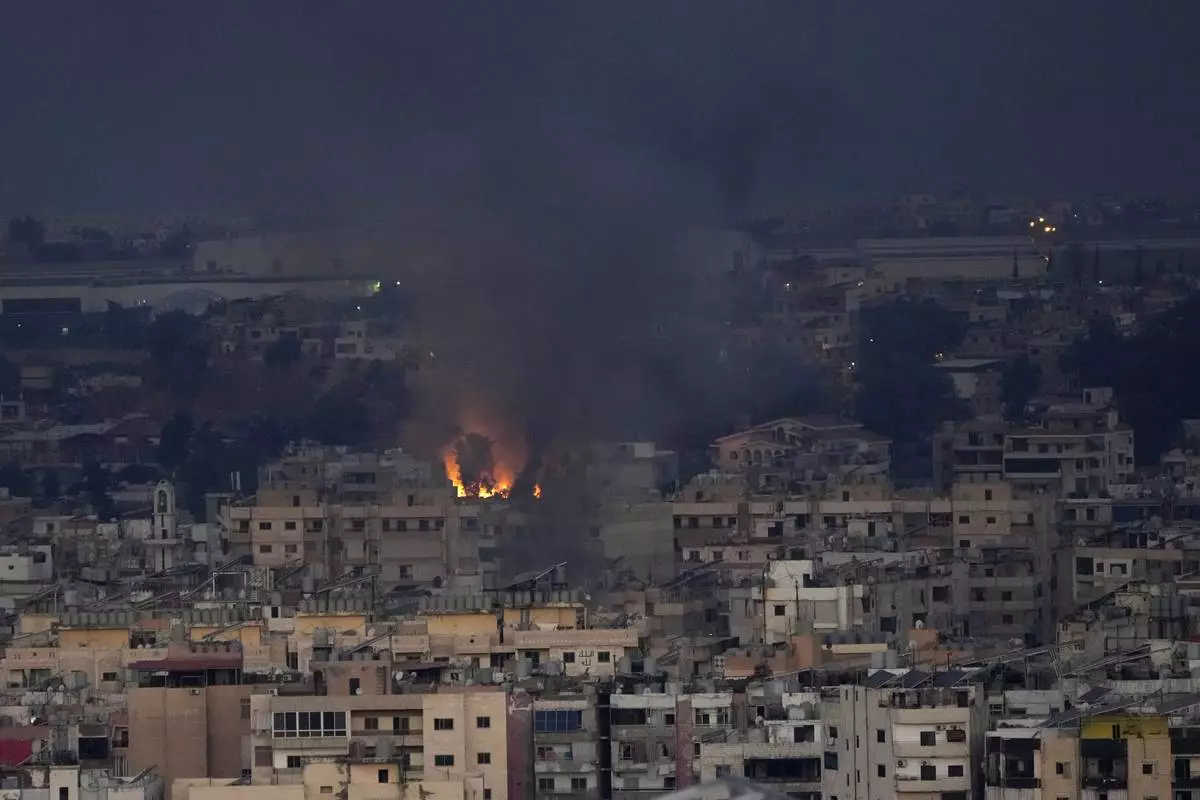
Flame and smoke rise from Israeli airstrikes hit a residential area that is a Hezbollah stronghold, in the southern suburbs of Beirut, Lebanon, Saturday, Sept. 28, 2024. (AP Photo/Hussein Malla)
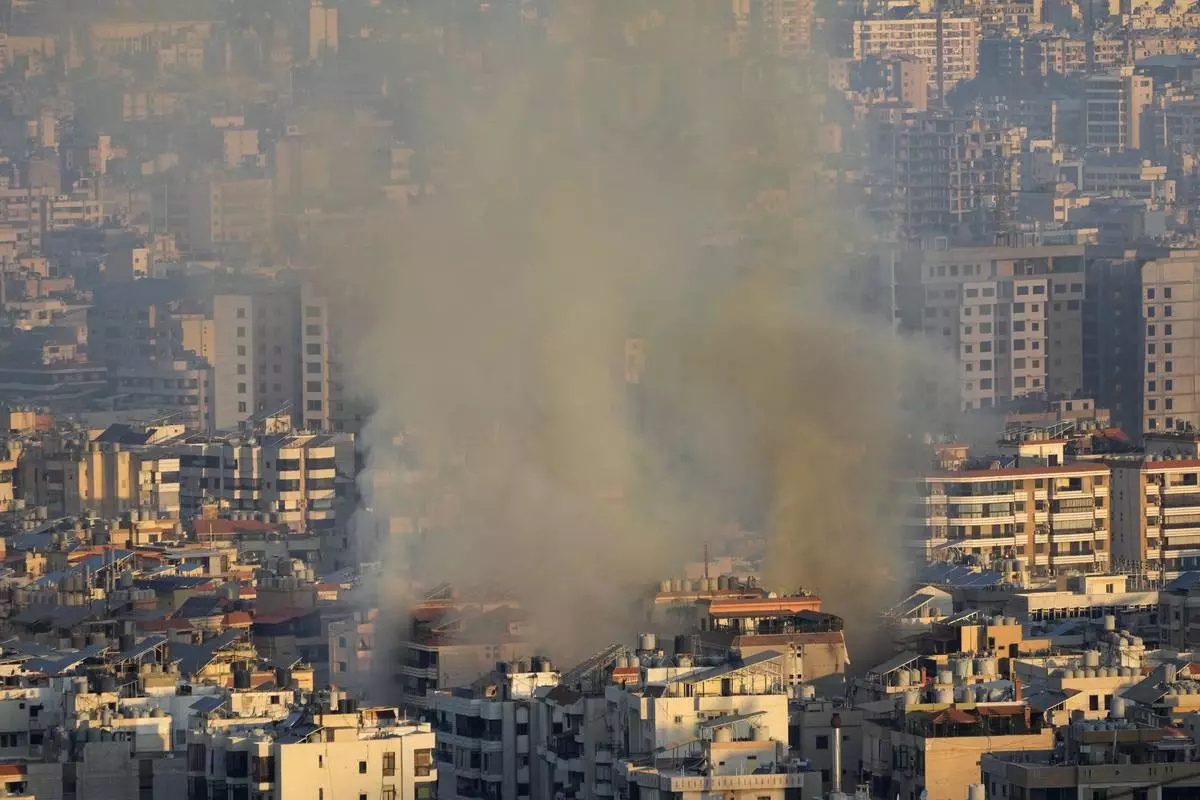
Smoke rises from an Israeli airstrike in the southern suburbs of Beirut, Lebanon, Saturday, Sept. 28, 2024. (AP Photo/Hussein Malla)
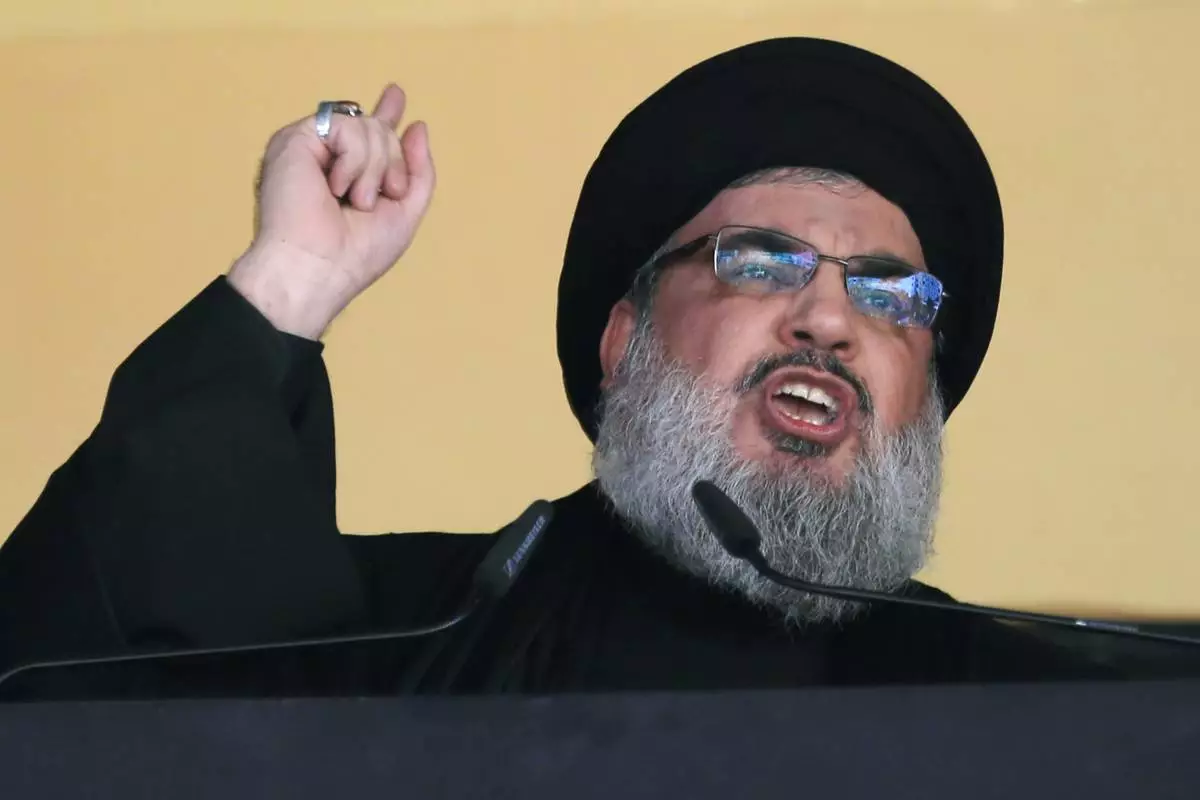
FILE - In this Oct. 24, 2015 file photo, Hezbollah leader Sheik Hassan Nasrallah addresses a crowd during the holy day of Ashoura, in a southern suburb of Beirut, Lebanon. (AP Photo/Hassan Ammar, File)
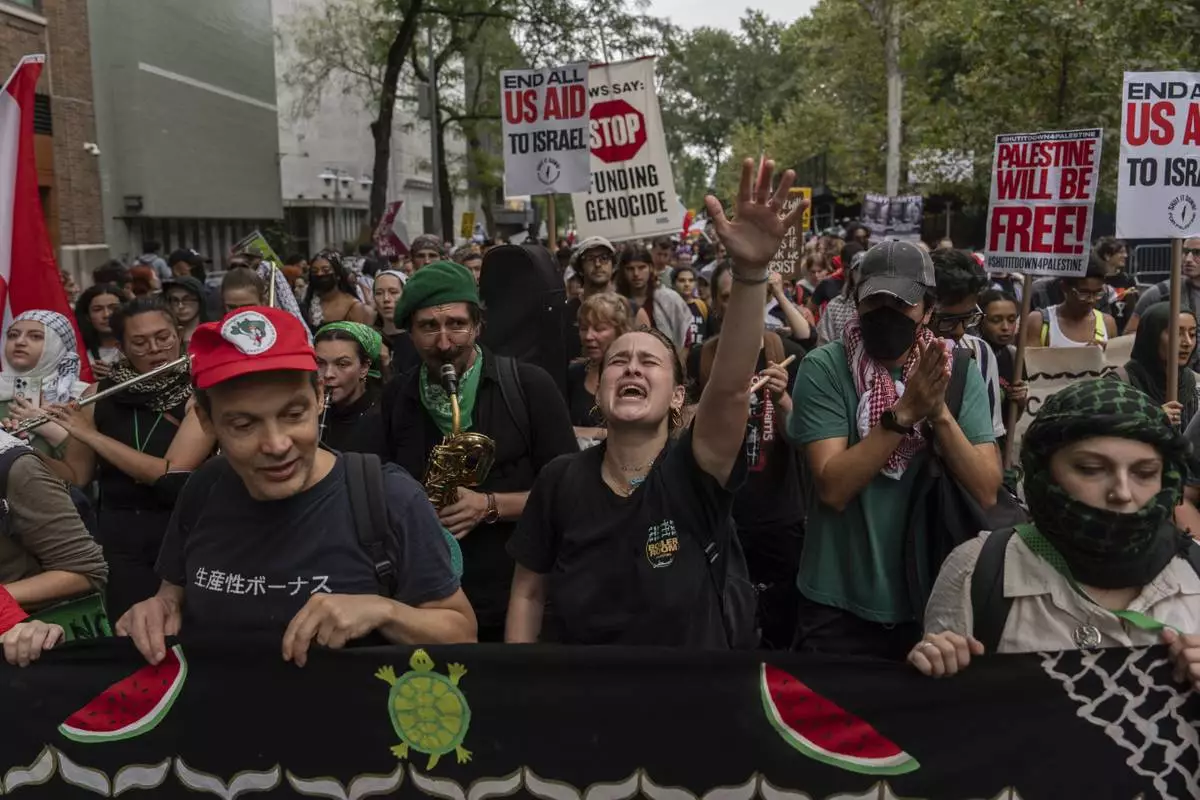
Palestinian supporters march near the United Nations headquarters at a protest against Israeli Prime Minister Benjamin Netanyahu during the 79th session of the UN General Assembly, Thursday, Sept. 26, 2024, in New York. (AP Photo/Julia Demaree Nikhinson)
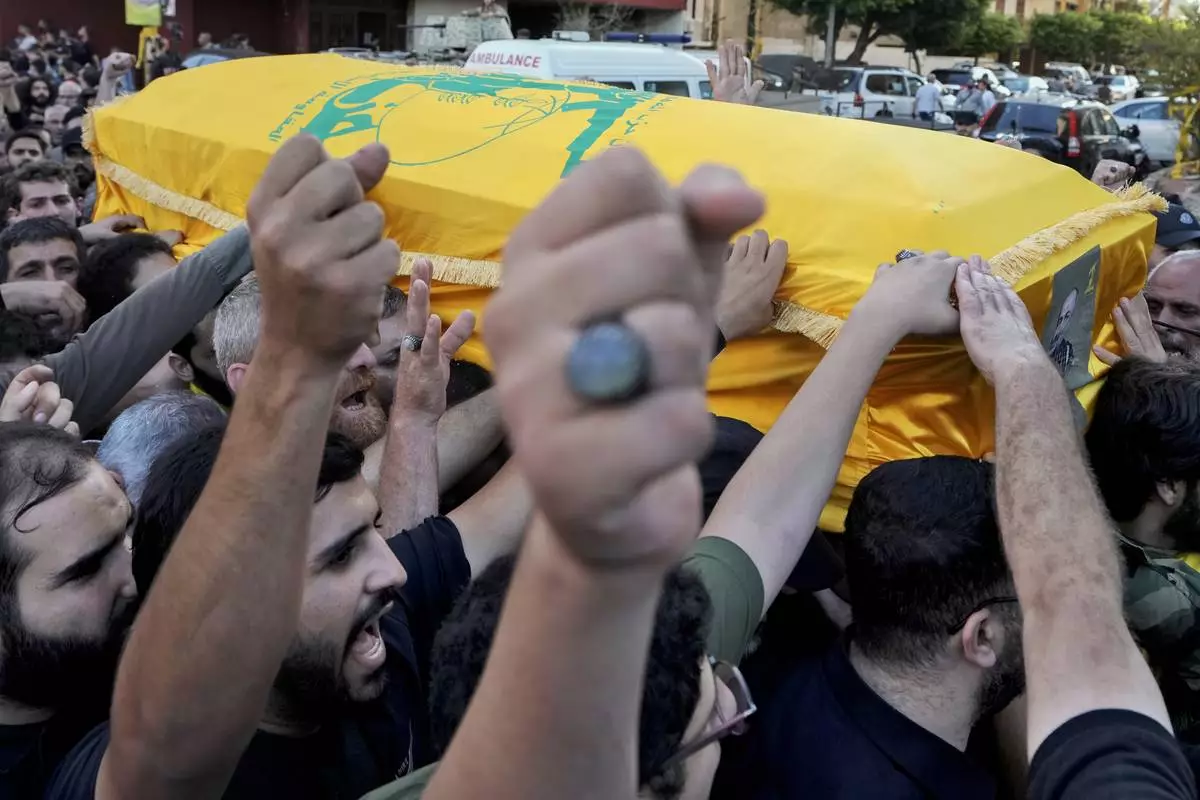
Mourners chant slogans as they carry the coffin of Hezbollah drone commander, Mohammed Hussein Surour, during his funeral procession in Beirut's southern suburbs, Friday, Sept. 27, 2024. (AP Photo/Bilal Hussein)
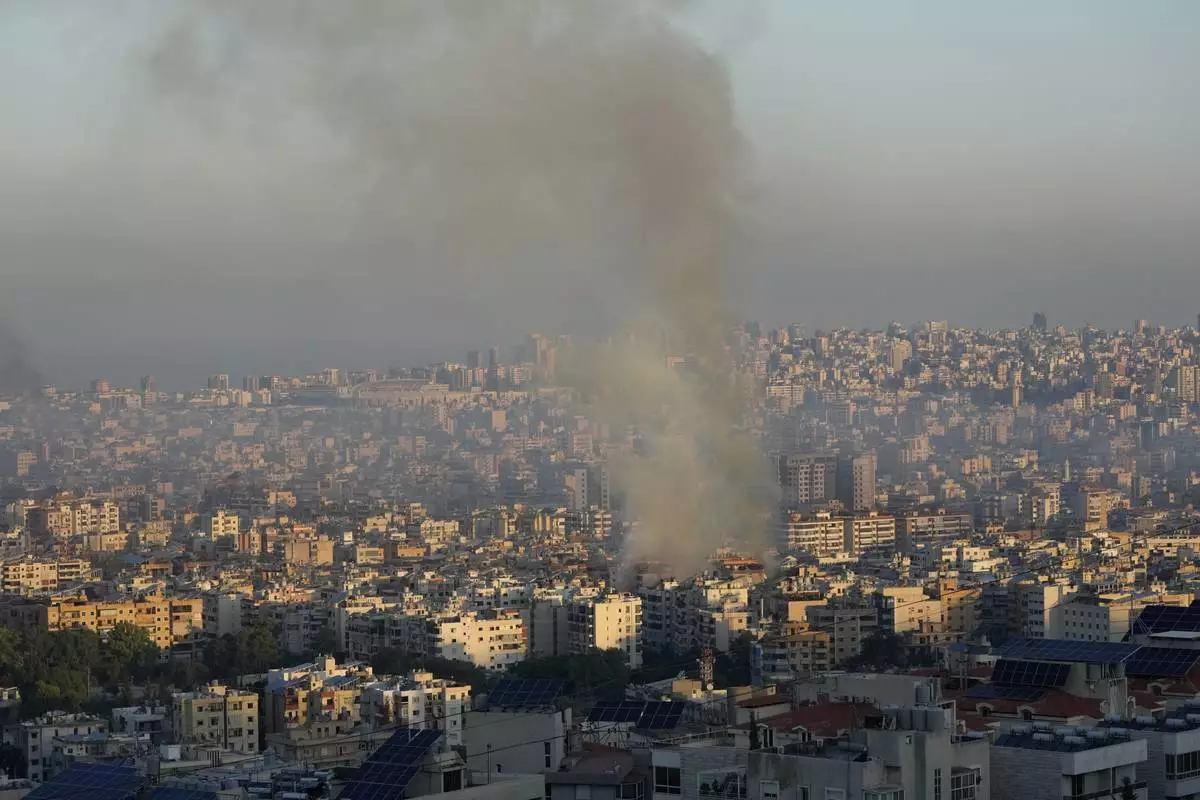
Smoke rises from an Israeli airstrike in the southern suburbs of Beirut, Lebanon, Saturday, Sept. 28, 2024. AP Photo/Hussein Malla)
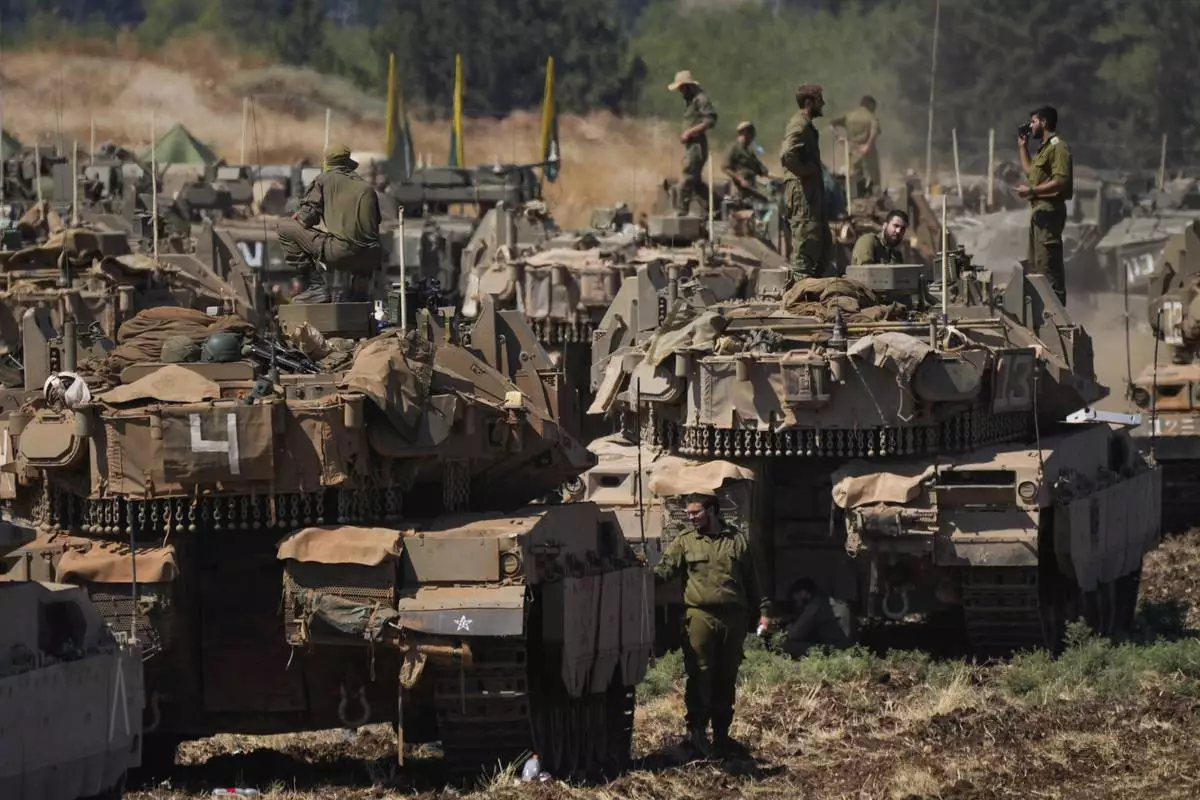
Israeli soldiers work on tanks in northern Israel on Friday, Sept. 27, 2024. (AP Photo/Baz Ratner)
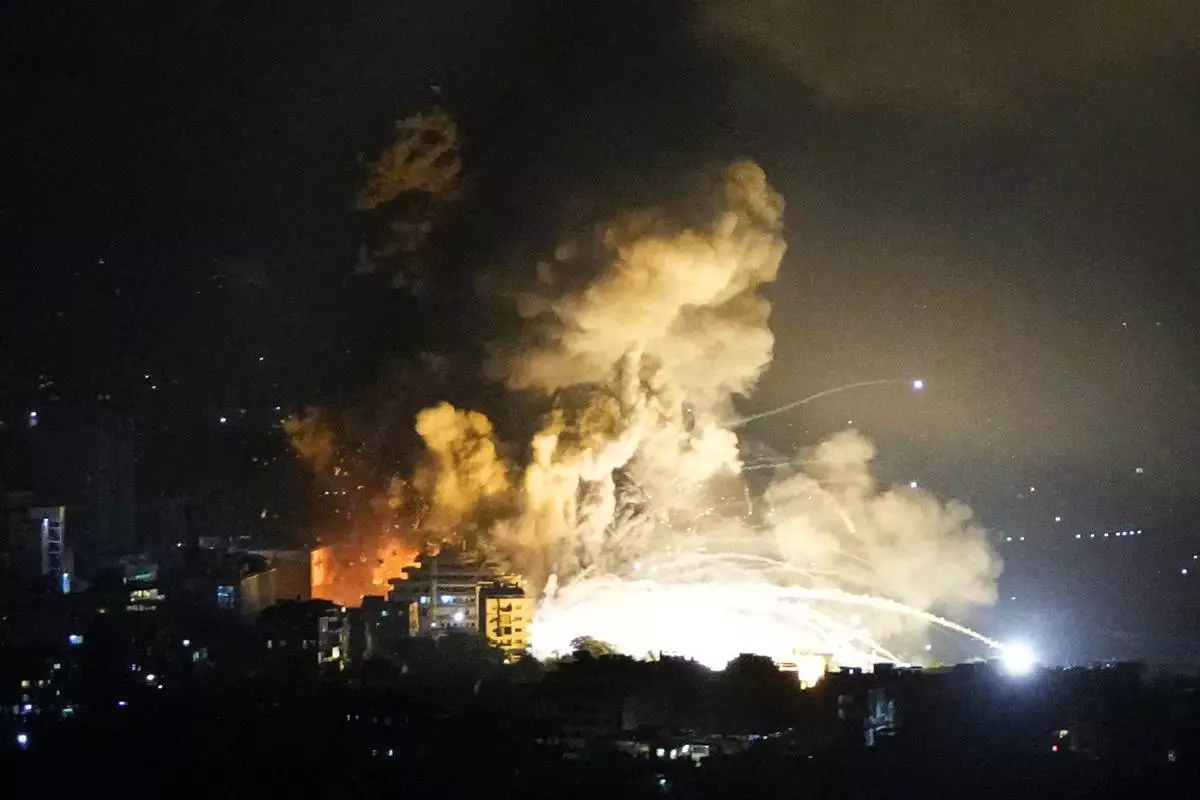
Smoke rises from Israeli airstrikes in Beirut's southern suburbs, Lebanon, Saturday, Sept. 28, 2024. (AP Photo/Hassan Ammar)
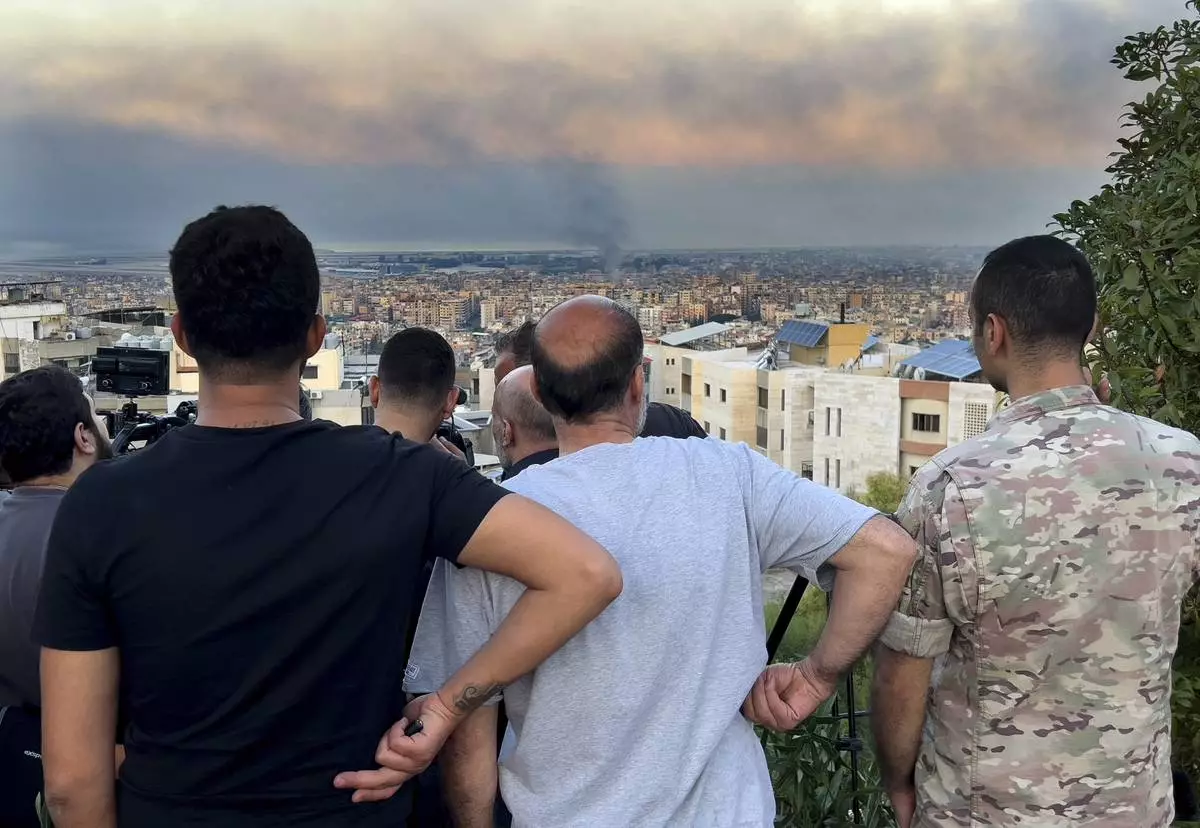
Lebanese citizens watch smoke rise from Israeli airstrikes in the southern suburbs of Beirut, Lebanon, Saturday, Sept. 28, 2024. (AP Photo/Hussein Malla)
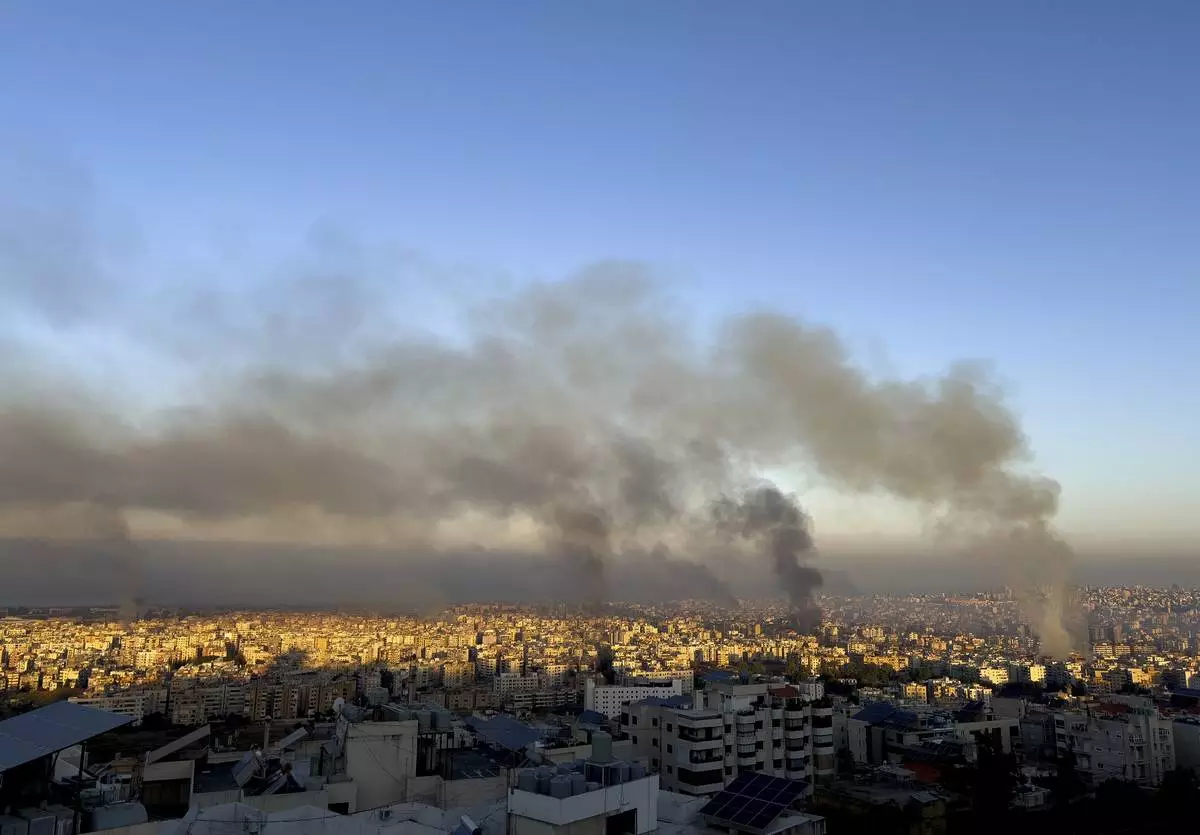
Smoke rises from Israeli airstrikes in the southern suburbs of Beirut, Lebanon, Saturday, Sept. 28, 2024. (AP Photo/Hussein Malla)















